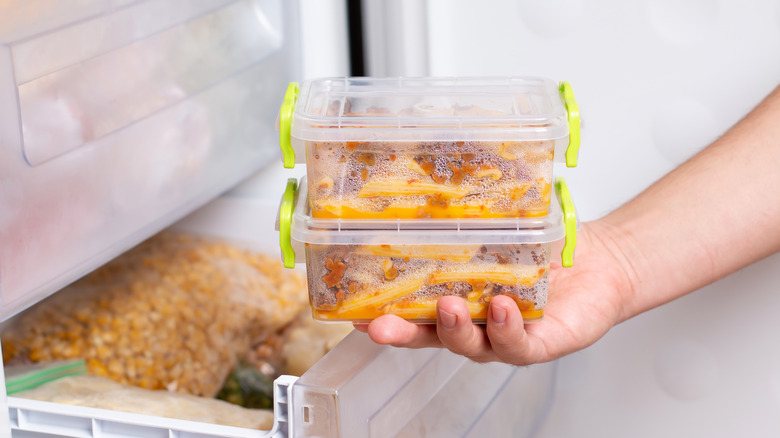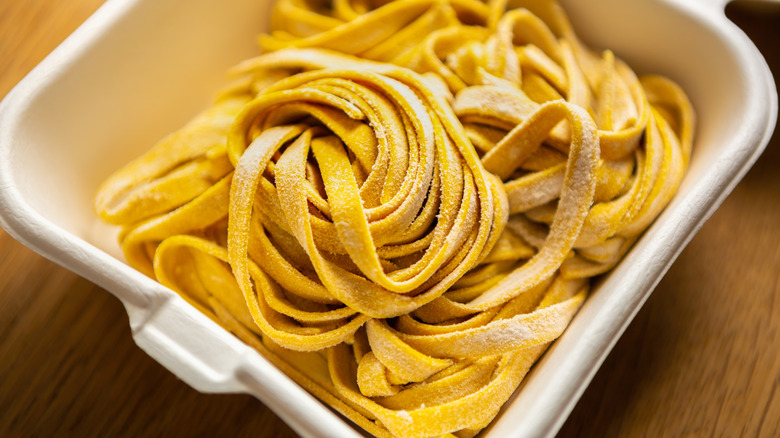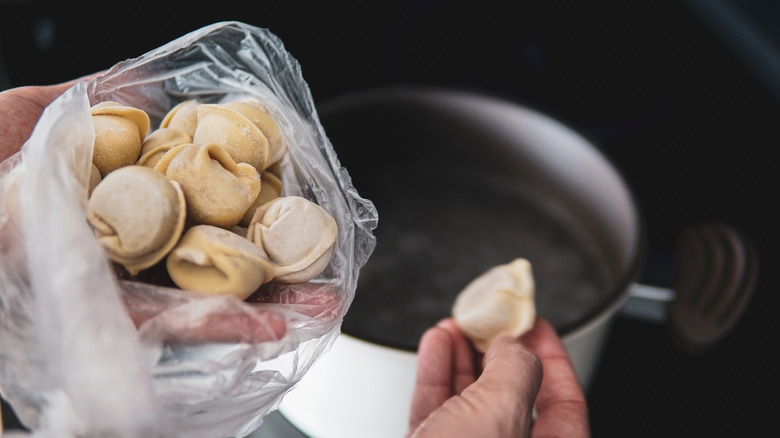How Long Does Cooked Pasta Last In Fridge?
If you boil too much pasta, adding it to your dish just to use it up may not be the best idea. Too many noodles combined with too little sauce can turn even the most flavorful bases depressingly bland. So, what do you do with that leftover boiled pasta? If it's spaghetti, you could make a quick side of spaghetti aglio e olio, or you could store your cooked pasta in the fridge for up to five days in an airtight container.
The caveat to storing cooked pasta is that it depends on the kind you're storing. The fresh, homemade kind contains egg and has a much shorter shelf life than store-bought packaged pasta. Pasta already mixed with sauce may have the longest shelf life, but the reheated version won't be quite as tasty as freshly prepared.
Stored correctly, boiled pasta can be revived to its former glory by mixing it with sauce before serving. If you use a pasta water substitute when combining your pasta and sauce, it can even taste like a freshly made dish. And just like that, refrigerating pasta becomes a time-saving kitchen hack for gratifying weeknight dinners, especially if you've already got some delicious pasta sauce in the pantry.
Cooked pasta lasts less than a week in the fridge
Refrigerating pasta doesn't stop it from going bad; it merely slows the process. Therefore, the first thing to remember is that any leftover cooked pasta should not be left out for extended periods. Per the USDA, food left at room temperature can build up dangerous bacteria levels within two hours, so don't wait until the meal is finished. Instead, as soon as it has cooled down, toss leftover boiled pasta with some olive oil to avoid it clumping together, put it in an airtight container or Ziploc bag, and refrigerate it. Unboiled homemade pasta should be sprinkled with dry flour to prevent it from sticking together and similarly stored.
While dry pasta should last up to five days in the fridge, it's a good idea to try and use it up within three. On the other hand, fresh pasta can only be kept in the fridge for a day. When you retrieve it, check for any unexpected odors, discoloration, or slimy texture before using it to ensure it hasn't spoiled.
If you're working with a cooked sauce, add the refrigerated pasta directly to the skillet with the heated sauce. Toss together for a few minutes, and your pasta dish is ready to go. Strange as it sounds, you'll also have to heat refrigerated pasta before making a cold pasta salad so it can better absorb flavors.
Cooked pasta can be frozen for up to three months
You can freeze cooked pasta for up to three months for prolonged storage. The method is the same as the one you would follow for refrigeration: use an anti-clumping agent like olive oil and store it in an airtight container. Remember to add the date on the package so you can keep track of how long your pasta has been frozen.
The most useful types of pasta to have in your freezer are stuffed ones like ravioli and tortellini. Whether store-bought or homemade, stuffed pasta can also be frozen for up to three months and retains its flavor and texture well. Since it already has a filling, you don't even have to bother with sauce, and a toss in the pan with some butter and herbs is enough to create a decadent dish. While most other frozen pasta requires thawing in the fridge for a few hours (especially freshly made pasta), frozen ravioli and tortellini can be added directly to the pan and cooked until heated through.
To revive regular pasta, thaw it in the fridge for a few hours and then plunge it into boiling water for about a minute to heat it. Any longer, you risk the pasta getting overboiled and losing its al dente texture. Since refrigeration invariably changes the texture of pasta, cold storage in the fridge or freezer is more suited to smaller pasta shapes than larger ones like lasagna sheets and cannelloni.


